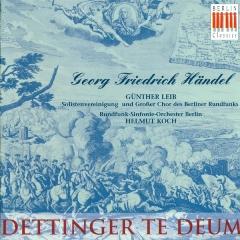Handel - Te Deum in D major, HWV 283, "Dettingen" (1999)
Handel - Te Deum in D major, HWV 283, "Dettingen" (1999)

1. Nr.1 Chor: Herr, Gott! Dir Sei Lob! 2. Nr.2 Chor: Alle Welt Verehret Dich 3. Nr.3 Chor: Dir Singt Der Engel Reiner Chor 4. Nr.4 Chor: Vor Dir Cherubim Und Seraphim 5. Nr.5 Chor: Der Hochgelobte Gott Der Apostel 6. Nr.6 Bassolo Und Chor: Du Bist Der Ehrenkonig O Christ 7. Nr.7 Arie: Als Du Auf Dich Genommen - Gunther Leib 8. Nr.8 Chor: Als Du Siegreich Zerbrachst Den Stachel Des Todes 9. Nr.9 Chor: Du Sitzest Zu Der Rechten Des Herrn 10. Nr.10 Chor: Nimm Uns Auf In Deiner Heil'gen Zahl 11. Nr.11 Chor: Tag Fur Tag Sei Dank Und Lob Dir 12. Nr.12 Arioso: Bewahr, O Herr, Du Treuer Gott - Gunther Leib 13. Nr.13 Chor: Herr, Auf Dich Steht Mein Hoffen Günther Leib – baritone Berlin Radio Symphony Orchestra Berlin Radio Symphony Chorus Helmut Koch – conductor
German-born George Frideric Handel emigrated to England and often wrote works extolling his adopted country. This Te Deum was written to celebrate Great Britain's victory at Dettingen, on June 27, 1743, over French forces. Lasting about 40 minutes, the work is divided into 13 sections and scored for soprano, alto, tenor and bass soloists; five-part chorus; and orchestra.
The first section, We praise Thee, O God, is more martial and celebratory in its brass-prominent orchestral writing and vigorous choral character than the title would suggest. The next movement, All the earth doth worship Thee, while festive and joyous, conveys a genuine angelic sense, and the ensuing movement, To Thee all angels cry aloud, in its lovely soprano solo, slow pacing, and gentler sonorities, contrasts well with the previous sections.
The following To Thee Cherubim and Seraphim is festive and colorful and dominated by the chorus, while The Glorious Company of the Apostles is, except for the lively ending, gentle and warm, featuring the bass and other soloists. No. 6, Thou art the King of Glory, O Christ, again takes on a more festive than spiritual character, the bass vigorously proclaiming praise to Christ.
The ensuing When Thou tookest upon Thee to deliver man is subdued, the bass again dominating. The following section When Thou hadst overcome the sharpness of death begins grimly with slashing string chords and dark choral writing, but the latter aspect soon turns festive and the remainder is lively and joyous.
The ninth section, Thou sittest at the right hand of God, at over five minutes, is the longest movement and features enchanting solo and ensemble work by the alto, tenor, and bass singers. The latter half is slow and ponderous, like the ensuing Make them to be numbered with Thy Saints. But the next movement, Day by day we magnify Thee, opens with a celebratory trumpet and orchestra, the joyous chorus soon joining in.
The penultimate section, Vouchsafe, O Lord, to keep us this day, features a passionate tenor solo, with the text beseeching the "Lord to have mercy." The concluding O Lord, in Thee I have trusted, returns to a more celebratory mood, though here, in the opening alto solo and later choral writing, there is less pomp and a more genuine spiritual sense than heard earlier. ---Robert Cummings, Rovi
download (mp3 @320 kbs):
uploaded yandex 4shared mega mediafire solidfiles zalivalka cloudmailru oboom








